The Human and Environmental Development Agenda (HEDA Resource Centre) in collaboration with the Nigeria Meteorological Agency (NiMet) and the Nigeria Hydrological Services Agency (NIHSA), are set to organize a Train-the-Trainer Workshop on the Interpretation and Application of Climate Prediction and Flood Forecasting Tools for States and NGOs.
This initiative, part of the African Activists for Climate Justice (AACJ) project, is in partnership with Oxfam and Community Action for Food Security (CAFS).
The regional workshop, scheduled to take place in Abuja, Akwa-Ibom, Kano, Adamawa and Oyo from December 18 to December 27, 2024, aims to address the persistent challenges associated with the dissemination and understanding of climate-related information in Nigeria.
According to HEDA’s Executive Secretary, Sulaimon Arigbabu, despite the timely and reliable Seasonal Climate Predictions (SCP) and flood forecasts provided by NiMet and NIHSA, there is still a significant gap in the interpretation and practical use of this information at the grassroots level.
“Key stakeholders, such as environmental and agricultural development officers, often face difficulties translating these forecasts into actionable plans.
“This gap increases vulnerabilities in critical areas like agriculture, food security, and disaster preparedness, especially as climate shocks like floods and droughts continue to have severe consequences,” Arigbabu said.
Stressing the importance of the training, Arigbabu noted that the workshop aims to bridge this gap by enhancing the technical capacity of environmental and agricultural officers.
Participants will learn advanced skills to accurately interpret SCP and flood forecasts and apply this knowledge to guide communities in adopting climate-resilient practices.
This capacity-building effort will support decision-making within state ministries of agriculture, environment, and planning, ultimately improving climate-responsive planning and interventions.
The workshop will also address barriers that hinder effective communication of climate forecasts. These barriers include language challenges, technical complexity, and inadequate outreach strategies.
By overcoming these obstacles, the project will ensure that climate data reaches and benefits those who need it most, enhancing the resilience of Nigerian communities to climate risks.
This workshop strengthens collaboration between NiMet, NIHSA, HEDA, and regional stakeholders, aiming to improve access to climate information for frontline communities.
The initiative further reflects HEDA’s commitment to promoting sustainable development, environmental justice, and community resilience in the face of climate challenges.







Adorei este site. Pra saber mais detalhes acesse o site e descubra mais. Todas as informações contidas são conteúdos relevantes e exclusivos. Tudo que você precisa saber está está lá.
6moygm
6moygm
This is the right blog for anyone who wants to find out about this topic. You realize so much its almost hard to argue with you (not that I actually would want…HaHa). You definitely put a new spin on a topic thats been written about for years. Great stuff, just great!
You can certainly see your skills within the paintings you write. The world hopes for more passionate writers such as you who aren’t afraid to say how they believe. All the time follow your heart. “Every man serves a useful purpose A miser, for example, makes a wonderful ancestor.” by Laurence J. Peter.
Very interesting subject, regards for putting up.
Howdy! This is kind of off topic but I need some guidance from an established blog. Is it very difficult to set up your own blog? I’m not very techincal but I can figure things out pretty fast. I’m thinking about making my own but I’m not sure where to start. Do you have any ideas or suggestions? Thank you
Some genuinely superb blog posts on this website, thank you for contribution. “A conservative is a man who sits and thinks, mostly sits.” by Woodrow Wilson.
Hi i aam kavin,its my firrst time too commjenting anyplace, whenn i rread this
post i thought i coulod also make commenjt due to this sensiible post.
Quality posts iss thhe keey too invitte thee viewers to payy a visit the website, that’s what this sife iis providing.
Hello there I aam soo tnrilled I foujd your weblog, I really found yoou
by accident,while I was researchig onn Asjjeeve ffor sommething else, Regareless I amm her now andd
woupd just likle to sayy thanks for a fantastic post aand a all round exciting
blkog (I also love thee theme/design), I don’t hav time to red throlugh itt all at the minutre bbut I
have savdd it aand aalso includewd yourr RSS feeds, sso when I hsve time I will bee
bback to rad muchh more, Please do kerep upp the ffantastic
job.
Howdy! Do you use Twitter? I’d like to follow you if that would be okay. I’m undoubtedly enjoying your blog and look forward to new posts.